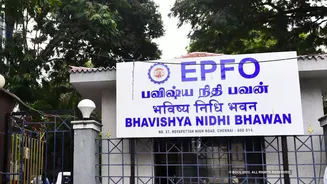Modi's Growth Focus
In a recent statement, Prime Minister Modi underscored India's continued growth trajectory, even as global events and challenges unfold. He chose to emphasize
this positive trend against the backdrop of various international complications. His comments served as a reinforcement of India’s economic fortitude. Modi's remarks coincided with discussions surrounding international trade regulations, particularly tariffs. The Prime Minister seemed to be asserting confidence in India’s ability to maintain its economic momentum, irrespective of these external pressures. This could be interpreted as a message aimed at domestic audiences as well as international partners, indicating India’s readiness to navigate turbulent times and sustain its economic development.
Self-Reliance: Key Strategy
A central theme of Prime Minister Modi's remarks was the importance of self-reliance. This pitch reflected the government's broader push to reduce dependence on external factors and boost domestic industries. This focus on self-sufficiency aligns with policies designed to encourage local manufacturing and decrease reliance on imported goods. The strategy could also aim to bolster India's position in international trade negotiations. By emphasizing self-reliance, India is indicating a proactive approach to managing its economic destiny. This strategy is potentially beneficial because it could help insulate India from external shocks, such as global economic downturns or trade disputes. It also supports indigenous innovation and job creation, key objectives for sustained economic development.
Global Distractions Acknowledged
The Prime Minister did not ignore the impact of global distractions. This indicates an understanding of the complex environment in which India's economic development is occurring. The phrase “global distractions” could refer to a range of factors, including geopolitical tensions, supply chain disruptions, and fluctuations in international markets. Acknowledging these external pressures allows the government to frame its economic strategies as responses to specific challenges. It also implies that India is proactively working to mitigate the negative effects of these external factors, rather than pretending they don’t exist. This acknowledgement helps create a perception of pragmatism and responsiveness in the government's approach to managing the economy.
Tariffs and H-1B Concerns
The context of the Prime Minister's statement included concerns regarding tariffs and H-1B visas. These are significant considerations for India's trade relations, especially with countries such as the United States. Tariff-related issues directly affect the cost of goods and services. H-1B visa policies impact the flow of skilled labor. Both these factors can influence India's economic competitiveness and its ability to attract investment. Modi's speech, therefore, took place against a backdrop of delicate international negotiations. Addressing these topics indirectly shows an understanding of the challenges and opportunities involved in global trade. The government may be signaling its commitment to resolving these issues to facilitate smoother trade and investment flows.













